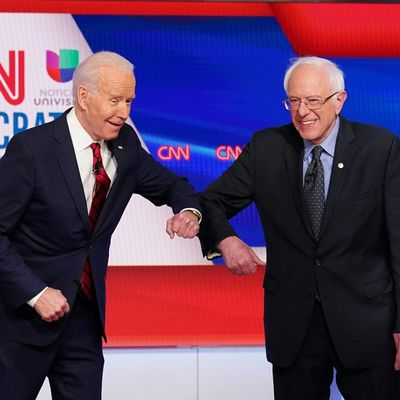
Coronavirus is all most Americans seem to be thinking about right now. Nevertheless, Sunday’s Democratic primary debate went on as scheduled — albeit in a new location and with an emphasis on the unfolding crisis. I spoke with national political correspondent Gabriel Debenedetti about the strangeness of what might be the last matchup of the primary.
Ben: There was a lot that was different about this debate than all the previous ones we’ve chatted about. Because of COVID-19, which feels like the only actual story in the country and world right now, the event was moved to Washington, D.C., from Phoenix and featured no audience (which worked beautifully, by the way). Joe Biden and Bernie Sanders stood a CDC-approved six feet from each other. And coronavirus took up a good portion of the evening, though not as much as it could have. One other major difference: There were only two candidates on that stage, thanks to Biden’s recent dominance and the resultant culling of the Democratic field. He’s looking to all but clinch the nomination on Tuesday, even if voting is down because of the virus. On Sunday, he seemed considerably more lucid and cogent than in many, if not all, of the previous debates; do you think he accomplished what he was going for?
Gabriel: Yes. He hammered home the “I’ve been here before; I can take over on day one” message and actually engaged in the directional fight about the future of the party that’s been underpinning a lot of the race so far, even if it’s usually been subtext. Sanders did what he set out to do, too, mostly. He just didn’t get the chance to press Biden specifically on all the issues he promised he would, because the big question right now isn’t “How will Biden win over Sanders voters?” (though that one’s time will come, presumably); it’s instead something like, “So wait, how are we going to survive the next few months as a functioning country?”
Ben: Indeed. As many on Twitter pointed out, it felt rather odd to watch candidates fighting over bankruptcy bills and old Social Security votes when the country seems on the verge of financial meltdown. But on the other hand, two hours on coronavirus probably wouldn’t have produced many great revelations that we didn’t hear in the first half hour, either. Did you think CNN and the candidates handled the topic appropriately?
Gabriel: Yeah, I predicted on Twitter that it’d be jarring once the conversation moved on from coronavirus, but I was pleasantly surprised, actually. This was the first one-on-one debate, so it’s appropriate, I think that they got to talk about areas where they don’t see eye-to-eye. But what was really telling to me was how cleanly their break in approach to the race, and politics in general, and even life played out in their answers about the virus. It was interesting! In a way that previous debates haven’t been.
Ben: In that Bernie feels the pandemic, which has once again exposed America’s inadequate health-care system, has only made the need for his political revolution more apparent — and Biden was more focused on solving the immediate problems caused by it and worrying about huge changes some other time?
Gabriel: Basically, yes. Though, to be clear, Biden acknowledged there is need for major change (though nowhere near as major as the ones Sanders is talking about), yet talked about “results, not revolution.” And Sanders talked about the need to fix things in the short run, as well. However — their contrasts in emphasis tell a huge part of the story of the party in the Trump era.
Ben: In what was the most newsworthy moment of the debate, Biden said, in response to a viewer question, that he would definitely pick a female running mate if he wins the nomination. Do you think that’s something the Biden team was trying to make known Sunday night, or did it just slip out spontaneously?
Gabriel: After the debate, the Biden team sure made it seem like they knew this was coming, and that does make sense: What better way to get people to think of you as president, other than reminding them you’ve already been in the Situation Room, than talking about your vice-president? It was definitely newsworthy, and it put the spotlight on Biden, but, of course, it wasn’t really all that shocking. He’s suggested this before, even if he didn’t say it outright, and no one really thought he wouldn’t pick a woman, right? (With apologies to Pete Buttigieg and Cory Booker … who maybe thought that.)
Ben: Polling tells us that Biden will dominate again on Tuesday in the four states that are holding primaries, like he did last Tuesday and the Tuesday before. Do you think Sanders will drop out of the race this week?
Gabriel: I’d always hesitate to make a prediction like that, but we should also note that voting could look very out of the ordinary on Tuesday because of the virus. (The latest CDC guidelines rule out gatherings of over 50 people. Well, what about polling places?) But if everything goes as planned, it will likely be even clearer that Biden is running away with the race. People around Sanders, though, have been pretty open that he wants to guide Biden toward him on some policy points, and they have long said they think competitive primaries are healthy. Again, the current state of things could change this thinking, but as we saw tonight, there’s no doubt he still is interested in pulling Biden left on a couple of issues, and he can’t do that very effectively if he’s not in the race. Now, will we see another debate? I’m not sure.





























